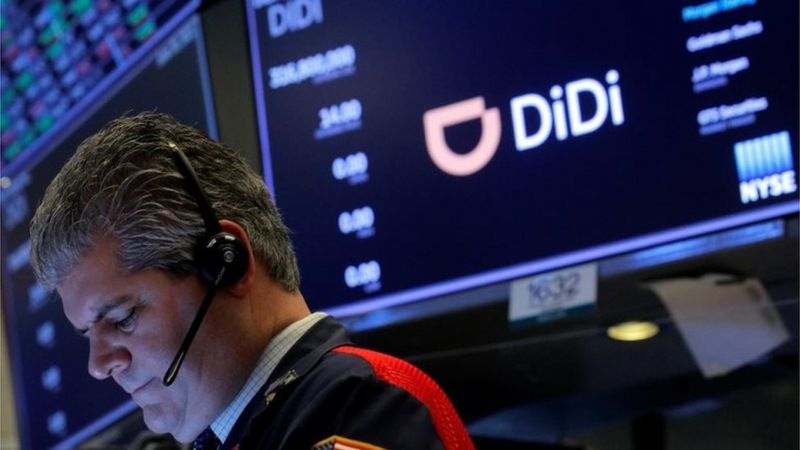Widgetized Section
Go to Admin » Appearance » Widgets » and move Gabfire Widget: Social into that MastheadOverlay zone
Didi announced its delisting from the US stock market to list in Hong Kong
Chinese ride-hailing giant Didi Chuxing announced on Friday that it will delist from the US and list on the Hong Kong Stock Exchange.
Shares of SoftBank Group, Didi’s largest shareholder, fell more than 2 percent after the announcement. Chinese concept stocks also tumbled in Hong Kong, with Alibaba falling 5.4% to a new low and Bilibili falling more than 7%.
Within 48 hours of Didi Chuxing’s low-key IPO in the US in late June, Chinese regulators announced a cyber security review. Since then, The Chinese government has stepped up its scrutiny of Didi, until it finally announced the end of its five-month-long listing in the US.
Didi is the epitome of the whole group of Chinese concept stocks. Under the influence of a series of policies such as “anti-monopoly”, “strengthening data security” and “double reduction”, the performance of Chinese concept stocks listed in the United States continues to decline. Coupled with the SEC’s increasing restrictions on Chinese concept stocks, the future of Chinese concept stocks is uncertain.
Didi’s return to Hong Kong shares shows regulators’ attitude towards tech listings and has implications for other listings destinations, analysts said.
“This incident has convinced the market that industry regulation of tech stocks in Mainland China will continue for the time being, and today’s drop in Hong Kong-listed tech stocks reflects this factor.” Kenny Ng, equity strategist at Everbright Sun Hung Kai in Hong Kong, believes Didi’s planned delisting in the US and listing in Hong Kong will have a clear impact on the location of future big tech listings.
Zheng Lei, chief economist of Baoxin Financial, told Reuters that China’s stock markets, including A-shares and Hong Kong shares, are becoming more and more attractive, and it is inevitable for leading companies such as Internet companies listed overseas to return to China due to safety and regulatory concerns over key strategic resources.
“Some companies have already completed secondary listings in Hong Kong and some may consider going straight back to A-share listings in the future.” Zheng Lei said.
Chinese companies listed on U.S. stock exchanges must disclose whether they are owned or controlled by a government entity and provide evidence of audit checks, the U.S. Securities and Exchange Commission (SEC) said Thursday. The rule sets in motion a process that could lead to more than 200 companies being kicked off U.S. exchanges.
To be sure, the exposure of Chinese companies to regulatory risk in both China and the US could make some Chinese companies less attractive to investors.
Hillhouse, one of China’s best-known asset management firms, has released its latest US stock holdings report, showing that hillhouse liquidates ride-hailing giants Didi Chuxing, netease and New Oriental in the third quarter.
Didi chuxing’s low-key LISTING in the US in late June sparked a flurry of regulatory turmoil. More than 20 apps, including Didi Chuxing, were removed from the App store, and the CaC joined forces with the Ministry of Public Security, The Ministry of State Security, the Ministry of Natural Resources, the Ministry of Transport, the State Administration of Taxation and the State Administration for Market Regulation to launch a cyber security review on Didi Chuxing.
“Didi’s story feels both natural and unexpected.” An investor in Hong Kong and Shenzhen told BBC Chinese that Didi’s ride-hailing business is already the biggest in China. It has already won the race, and it is time to reap the rewards. However, the company has been unprofitable and the epidemic has hit.

“However, with a rebound after the epidemic, revenue will look better, plus the good US stock market, it is a good time to go public, plus there are too many investors behind Didi, and the betting agreement, and convertible preferred shares, so it may be too late to go public. So it makes sense.”
Convertible preferred stock refers to a group of preferred stock holders who may convert equity into debt if the company does not perform well. If the company can’t go public and can’t make a profit, it may suddenly face a lot of debt because of this setup.
The investment, he says, is “unexpected is, have never thought so hard” is on their scalp – looking back now, regulators said a greeting to listed seems to be, but the domestic first compliance, because over the years developed network about car industry rules, drops have not been able to complete the compliance, and the mapping of permission level is very high, Whether the audit paper should be given to the PCAOB may have to be negotiated first, “or it could be caught in the U.S. like TikTok.”
“Data security is not the core of the problem,” Anbang said in an analysis emailed to BBC Chinese. “Didi also explained that the core reason for its data center is geopolitics.” After the game in recent years, Sino-US relations have gradually entered the stage of great power geopolitical game, and “national interests” have begun to become an important issue in the relationship between the two countries.
“From this perspective, whether or not Didi goes public, and where it goes public, is now given a tinge of ‘national interest’ and is related to sino-US competition. The caC’s continuous demand for rectification shows the possibility that the inner circle in Korea does not want to rely on the U.S. “If this is true, future investments in important sectors with significant reliance on US capital markets and technology will not be an obvious blessing.” Anbang Think Tank analysis.
“The Didi investigation is a significant event and marks the end of the brutal growth of Chinese Internet companies.” Ming Liao, founding partner of Prospect Avenue Capital, says the Chinese government has taken a relatively laissez-faire approach to legal compliance for tech companies over the past two decades, favouring efficiency and growth over fairness. Companies like Didi are too big to solve. No one knows what will happen next.


